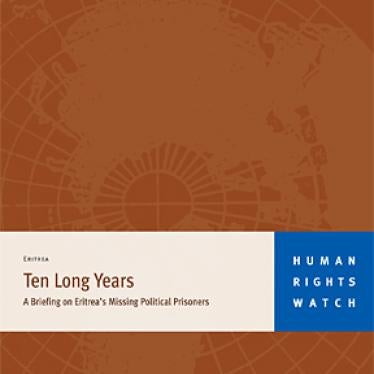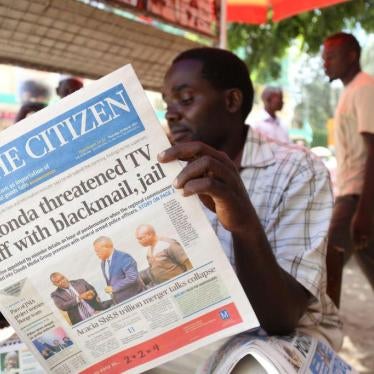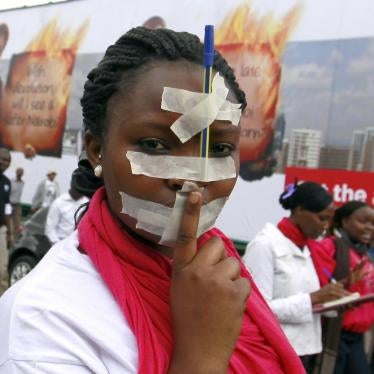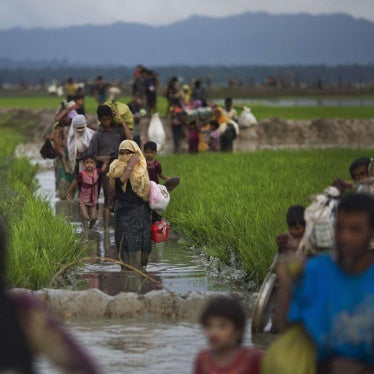(New York) – Ten years after President Isaias Afewerki of Eritrea ordered the detention of 21 senior government members and journalists who criticized him, his government should release the detainees or reveal their fate, Human Rights Watch said in a briefing paper released today. Eritrea should also open its jails to international monitors, Human Rights Watch said.
Isaias is visiting New York for the United Nations General Assembly in an attempt to rehabilitate his country’s image even as his government labors under UN sanctions for its role in supporting the Somali insurgent group al-Shabaab.
In the past 10 years, Isaias has closed all independent media outlets and turned Eritrea into a country where arbitrary arrest, torture, disappearance, and death are rife and where it is almost impossible to leave. The paper, “Eritrea: 10 Long Years, A Briefing on Eritrea’s Missing Political Prisoners,” outlines what is known about the political prisoners, none of whom has been seen by outsiders since being detained in September 2001.
“Eritrea is effectively a giant prison, and international pressure should continue on Eritrea until President Isaias frees political prisoners and restores the rule of law,” said Daniel Bekele, Africa director at Human Rights Watch. “To start with, President Isaias should end the inhumanity of prolonged secret, silent detention and allow family members and international monitors to see the prisoners.”
In mid-September 2001, Isaias ordered the arrest of 11 high government officials who had written open letters criticizing his rule. He also arrested 10 journalists who had published the letters and other information critical of him and his policies, and closed all independent newspapers.
The 20 men and one woman have never been seen again by anyone outside the penal system, including their families, lawyers, or prison monitoring groups. They have never been afforded a hearing; rather, all 21 were incarcerated in secret detention facilities in solitary confinement. According to former guards whose reports Human Rights Watch has not been able to confirm, 10 of the 21 have died in prison and the remaining 11 are physically or mentally incapacitated and emaciated.
The 21 are the most prominent victims of Isaias’s denial of basic rights, but hundreds of thousands of others in the country of 5 million have been victimized during the past decade. The briefing paper recounts that thousands of Eritreans are incarcerated because they are suspected of not fully supporting the regime or have attempted to flee Eritrea’s compulsory and indefinite national service. They are given no access to a court and no means to appeal to any impartial body. Thousands more Eritreans are incarcerated because they are members of religious groups that the Eritrean government refuses to recognize as legitimate: Jehovah’s Witnesses, evangelical Christian churches, and reformist wings of the Eritrean Orthodox Church.
Since 2002, Eritrean men and women between 18 and 60 have been inducted into national service that extends indefinitely. Many conscripts are used in forced labor for government-party commercial enterprises or in businesses owned by high-ranking military commanders. Female recruits report frequent sexual abuse by military commanders. Pay is a bare minimum, inadequate to support a family.
A 2009 Human Rights Watch report, “Service for Life: State Repression and Indefinite Conscription in Eritrea,” described how political and religious prisoners and members of national service who object to the conditions under which they serve or who try to flee prolonged service, are tortured. Aside from severe beatings, torture methods included mock drowning, being shackled in painful positions, being trussed into tires and rolled about, and being hung from trees. Conditions of confinement amount to cruel, inhuman, and degrading treatment. Many prisoners are detained underground for months or years. Others are kept in shipping containers where temperatures are broiling during the day and freezing at night. Prisoners receive little or no medical assistance. Deaths in captivity occur frequently.
According to the UN refugee agency, about 3,000 Eritreans flee the country every month. Leaving national service or fleeing the country without permission is considered tantamount to treason by the authorities.
Isaias is in New York to object to sanctions imposed by the UN Security Council on him and his government because of Eritrea’s alleged violation of an arms embargo on Somalia and Eritrea’s invasion of Djiboutian territory in 2008. Isaias complains that the council had not given Eritrea an opportunity to refute the evidence against it and to receive a fair hearing. He has not accorded such rights to the people of Eritrea for the past 10 years.
“Instead of lobbying the UN, President Isaias should allow people to speak freely, to worship as they please, and to leave Eritrea if they want,” said Bekele. “Eritreans will continue to face prolonged, indefinite national service, repression, and torture unless President Isaias changes his abusive policies.”
Human Rights Watch said other nations should not send Eritreans who flee back home because they would be at risk in Eritrea simply for having left the country.







